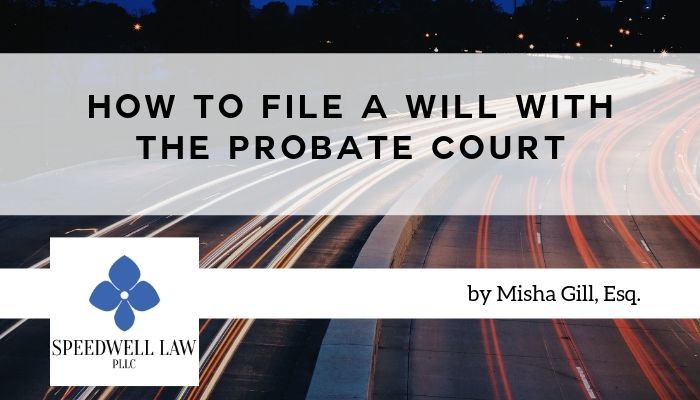
How to File a Will With the Probate Court
The probate process begins when a person (typically the personal representative/estate executor of a recently deceased person) files a will in the probate court. The court then goes to work establishing its validity and granting permission to the executor to execute the will in accordance with its terms.
The purpose of this process is to prevent fraud from occurring after a person passes away. In a sense, the court freezes the estate until a judge is able to certify that the will is valid, all relevant parties have been informed of the passing of the decedent, that all of the property has been identified and valuated and that all creditors and taxes have been paid before the property distribution process begins.
Each state’s processes for filing a will with the probate court and then going through probate itself may vary a bit, so what can you expect here in Virginia? Here’s a quick overview:
- Location: You must file the will with the probate court in the county in which the decedent lived. You cannot file the will in the county where you reside if it differs from that of the decedent.
- Petition for probate: Along with the will, you must also file a Petition for Probate, which requests the appointment of an executor. If you’re the one filing the will, it’s likely you were assigned in the will to be the executor. Otherwise, if no will existed, the court would be in charge of appointing someone to serve as the estate’s executor.
- Deadlines: You do not have an unlimited time after the death of the decedent to file the will in court. You are required by law to bring the will to court if you come into possession of it, and the general recommendation is to do so within 30 days of the passing of the decedent.
- Original copy: Any document you submit to the probate court must be an original copy of the will. It cannot be a photocopy or a digital copy—it must be an original, physical document signed by the decedent and witnesses for it to be declared legally valid.
- Death certificate: When you file the will in probate court, you must also produce a death certificate as part of the process. Again, this must be an original certificate—a copy will not suffice for these purposes.
Once you have filed the will in probate court, you will then need to prepare yourself for the rest of the probate process. The complexity of that process can range greatly based on the complexity and value of the estate, and it is highly recommended you work with an attorney to get through the process as smoothly as possible.
Follow the Speedwell Blog HERE.
Schedule Your Consultation with Our Alexandria Estate Planning Attorney
Misha Gill is an Alexandria estate planning attorney for his firm, Speedwell Law, PLLC. If you would like assistance in setting up your own will, living trust, and other estate planning documents, Misha can be reached at (703) 553-2577 or [email protected].
This post, including any of its contents or links, is not intended to provide you with legal advice. It provides personal perspectives on legal news and developments. Reading this post, leaving a comment, or communicating with its author by email or over the Internet does not create any attorney-client relationship.





